29 Review of Solving Systems of Equations
 Instructor’s Notes
Instructor’s Notes
One mathematical skill you will need in this unit is the ability to solve systems of linear equations. In class, and on exams, we will stick to two-equations with two-unkowns (what I call 2×2). However, in some of the additional practice problems, you will need to go to three-equations with three-unknowns (3×3). To help everyone refresh their memories on how to do this, I am assigning a few problems. If you are familiar, just go ahead and try them. If you need some review, I have included Section 7.1 – Systems of Linear Equations: Two Variables from the OpenStax College Algebra 2e textbook.
Homework
18. Solve a system with two equations and two unknowns.
19. Solve a system with three equations and three unknowns.
Systems of Linear Equations: Two Variables
Learning Objectives
In this section, you will:
- Solve systems of equations by graphing.
- Solve systems of equations by substitution.
- Solve systems of equations by addition.
- Identify inconsistent systems of equations containing two variables.
- Express the solution of a system of dependent equations containing two variables.

Introduction to Systems of Equations
In order to investigate situations such as that of the skateboard manufacturer, we need to recognize that we are dealing with more than one variable and likely more than one equation. A system of linear equations consists of two or more linear equations made up of two or more variables, such that all equations in the system are considered simultaneously. To find the unique solution to a system of linear equations, we must find a numerical value for each variable in the system that will satisfy all equations in the system at the same time. Some linear systems may not have a solution, and others may have an infinite number of solutions. For a linear system to have a unique solution, there must be at least as many equations as there are variables. Even so, this does not guarantee a unique solution.
In this section, we will look at systems of linear equations in two variables, which consist of two equations that contain two different variables. For example, consider the following system of linear equations in two variables.
The solution to a system of linear equations in two variables is any ordered pair that satisfies each equation independently. In this example, the ordered pair (4, 7) is the solution to the system of linear equations. We can verify the solution by substituting the values into each equation to see if the ordered pair satisfies both equations. Shortly, we will investigate methods of finding such a solution if it exists.
In addition to considering the number of equations and variables, we can categorize systems of linear equations by the number of solutions. A consistent system of equations has at least one solution. A consistent system is considered to be an independent system if it has a single solution, such as the example we just explored. The two lines have different slopes and intersect at one point in the plane. A consistent system is considered to be a dependent system if the equations have the same slope and the same y-intercepts. In other words, the lines coincide, so the equations represent the same line. Every point on the line represents a coordinate pair that satisfies the system. Thus, there are an infinite number of solutions.
Another type of system of linear equations is an inconsistent system, which is one in which the equations represent two parallel lines. The lines have the same slope and different y-intercepts. There are no points common to both lines; hence, there is no solution to the system.
Types of Linear Systems
There are three types of systems of linear equations in two variables, and three types of solutions.
- An independent system has exactly one solution pair
The point where the two lines intersect is the only solution.
- An inconsistent system has no solution. Notice that the two lines are parallel and will never intersect.
- A dependent system has infinitely many solutions. The lines are coincident. They are the same line, so every coordinate pair on the line is a solution to both equations.
Figure 2 compares graphical representations of each type of system.
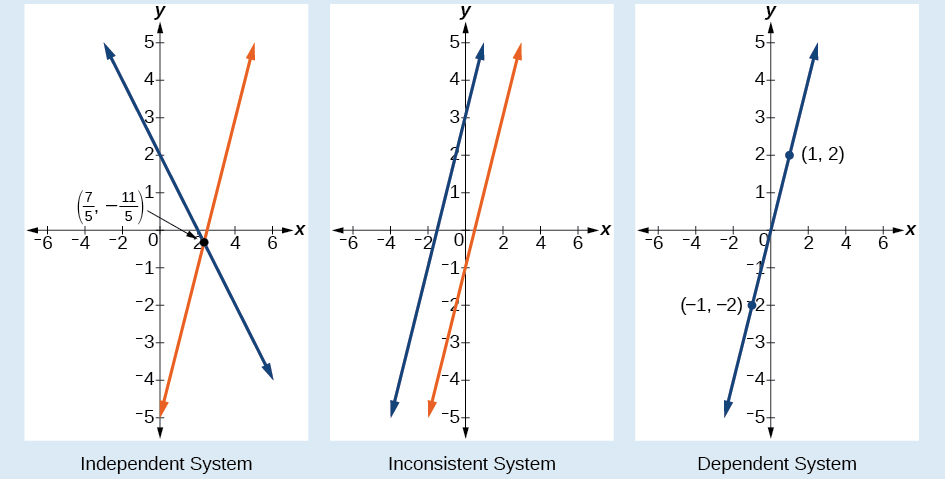
How To
Given a system of linear equations and an ordered pair, determine whether the ordered pair is a solution.
- Substitute the ordered pair into each equation in the system.
- Determine whether true statements result from the substitution in both equations; if so, the ordered pair is a solution.
Determining Whether an Ordered Pair Is a Solution to a System of Equations
Determine whether the ordered pairis a solution to the given system of equations.
Substitute the ordered pair into both equations.
The ordered pair satisfies both equations, so it is the solution to the system.
Analysis
We can see the solution clearly by plotting the graph of each equation. Since the solution is an ordered pair that satisfies both equations, it is a point on both of the lines and thus the point of intersection of the two lines. (See Figure 3).
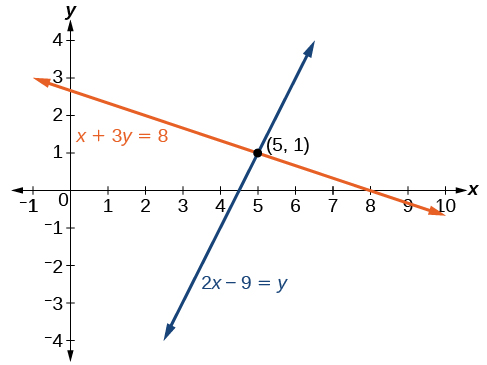
Try It
Determine whether the ordered pairis a solution to the following system.
Solving Systems of Equations by Graphing
There are multiple methods of solving systems of linear equations. For a system of linear equations in two variables, we can determine both the type of system and the solution by graphing the system of equations on the same set of axes.
Solving a System of Equations in Two Variables by Graphing
Solve the following system of equations by graphing. Identify the type of system.
Solve the first equation for
Solve the second equation for
Graph both equations on the same set of axes as in Figure 4.
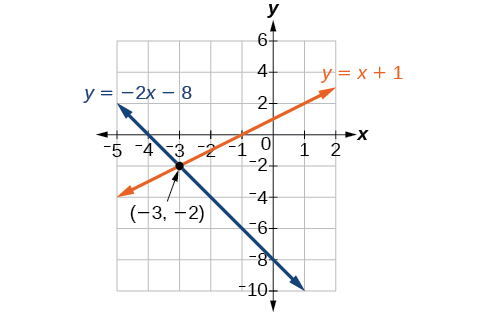
The lines appear to intersect at the point We can check to make sure that this is the solution to the system by substituting the ordered pair into both equations.
The solution to the system is the ordered pair so the system is independent.
Try It
Solve the following system of equations by graphing.
The solution to the system is the ordered pair

Can graphing be used if the system is inconsistent or dependent?
Yes, in both cases, we can still graph the system to determine the type of system and solution. If the two lines are parallel, the system has no solution and is inconsistent. If the two lines are identical, the system has infinite solutions and is a dependent system.
Solving Systems of Equations by Substitution
Solving a linear system in two variables by graphing works well when the solution consists of integer values, but if our solution contains decimals or fractions, it is not the most precise method. We will consider two more methods of solving a system of linear equations that are more precise than graphing. One such method is solving a system of equations by the substitution method, in which we solve one of the equations for one variable and then substitute the result into the second equation to solve for the second variable. Recall that we can solve for only one variable at a time, which is the reason the substitution method is both valuable and practical.
How To
Given a system of two equations in two variables, solve using the substitution method.
- Solve one of the two equations for one of the variables in terms of the other.
- Substitute the expression for this variable into the second equation, then solve for the remaining variable.
- Substitute that solution into either of the original equations to find the value of the first variable. If possible, write the solution as an ordered pair.
- Check the solution in both equations.
Solving a System of Equations in Two Variables by Substitution
Solve the following system of equations by substitution.
First, we will solve the first equation for
Now we can substitute the expression for
in the second equation.
Now, we substitute into the first equation and solve for
Our solution is
Check the solution by substituting into both equations.
Try It
Solve the following system of equations by substitution.
Can the substitution method be used to solve any linear system in two variables?
Yes, but the method works best if one of the equations contains a coefficient of 1 or –1 so that we do not have to deal with fractions.
Solving Systems of Equations in Two Variables by the Addition Method
A third method of solving systems of linear equations is the addition method. In this method, we add two terms with the same variable, but opposite coefficients, so that the sum is zero. Of course, not all systems are set up with the two terms of one variable having opposite coefficients. Often, we must adjust one or both of the equations by multiplication so that one variable will be eliminated by addition.
How To
Given a system of equations, solve using the addition method.
- Write both equations with x– and y-variables on the left side of the equal sign and constants on the right.
- Write one equation above the other, lining up corresponding variables. If one of the variables in the top equation has the opposite coefficient of the same variable in the bottom equation, add the equations together, eliminating one variable. If not, use multiplication by a nonzero number so that one of the variables in the top equation has the opposite coefficient of the same variable in the bottom equation, then add the equations to eliminate the variable.
- Solve the resulting equation for the remaining variable.
- Substitute that value into one of the original equations and solve for the second variable.
- Check the solution by substituting the values into the other equation.
Solving a System by the Addition Method
Solve the given system of equations by addition.
Both equations are already set equal to a constant. Notice that the coefficient of in the second equation, –1, is the opposite of the coefficient of
in the first equation, 1. We can add the two equations to eliminate
without needing to multiply by a constant.
Now that we have eliminated we can solve the resulting equation for
Then, we substitute this value for into one of the original equations and solve for
The solution to this system is
Check the solution in the first equation.
Analysis
We gain an important perspective on systems of equations by looking at the graphical representation. See Figure 6 to find that the equations intersect at the solution. We do not need to ask whether there may be a second solution because observing the graph confirms that the system has exactly one solution.
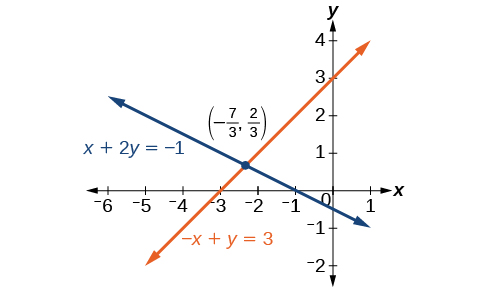
Using the Addition Method When Multiplication of One Equation Is Required
Solve the given system of equations by the addition method.
Adding these equations as presented will not eliminate a variable. However, we see that the first equation has in it and the second equation has
So if we multiply the second equation by
the x-terms will add to zero.
Now, let’s add them.
For the last step, we substitute into one of the original equations and solve for
Our solution is the ordered pair (See Figure 7). Check the solution in the original second equation.
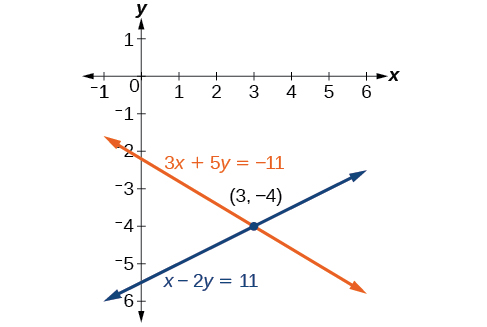
Try It
Solve the system of equations by addition.
Using the Addition Method When Multiplication of Both Equations Is Required
Solve the given system of equations in two variables by addition.
One equation has and the other has
The least common multiple is
, so we will have to multiply both equations by a constant in order to eliminate one variable. Let’s eliminate
by multiplying the first equation by
and the second equation by
Then, we add the two equations together.
Substitute into the original first equation.
The solution is Check it in the other equation.
(See Figure 8).
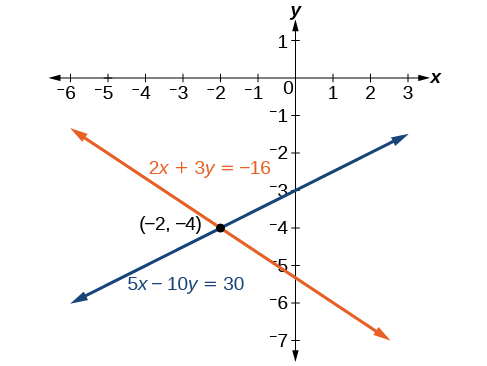
Using the Addition Method in Systems of Equations Containing Fractions
Solve the given system of equations in two variables by addition.
First clear each equation of fractions by multiplying both sides of the equation by the least common denominator.
Now multiply the second equation by so that we can eliminate the x-variable.
Add the two equations to eliminate the x-variable and solve the resulting equation.
Substitute into the first equation.
The solution is Check it in the other equation.
Try It
Solve the system of equations by addition.
Identifying Inconsistent Systems of Equations Containing Two Variables
Now that we have several methods for solving systems of equations, we can use the methods to identify inconsistent systems. Recall that an inconsistent system consists of parallel lines that have the same slope but different -intercepts. They will never intersect. When searching for a solution to an inconsistent system, we will come up with a false statement, such as
Solving an Inconsistent System of Equations
Solve the following system of equations.
We can approach this problem in two ways. Because one equation is already solved for the most obvious step is to use substitution.
Clearly, this statement is a contradiction because Therefore, the system has no solution.
The second approach would be to first manipulate the equations so that they are both in slope-intercept form. We manipulate the first equation as follows.
We then convert the second equation expressed to slope-intercept form.
Comparing the equations, we see that they have the same slope but different y-intercepts. Therefore, the lines are parallel and do not intersect.
Analysis
Writing the equations in slope-intercept form confirms that the system is inconsistent because all lines will intersect eventually unless they are parallel. Parallel lines will never intersect; thus, the two lines have no points in common. The graphs of the equations in this example are shown in Figure 9.
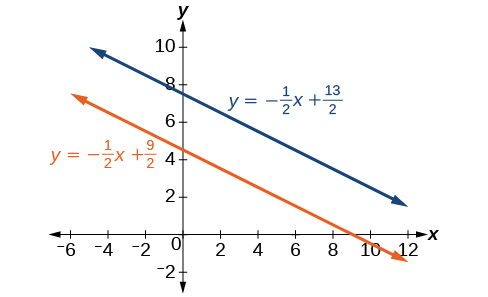
Try It
Solve the following system of equations in two variables.
Expressing the Solution of a System of Dependent Equations Containing Two Variables
Recall that a dependent system of equations in two variables is a system in which the two equations represent the same line. Dependent systems have an infinite number of solutions because all of the points on one line are also on the other line. After using substitution or addition, the resulting equation will be an identity, such as
Finding a Solution to a Dependent System of Linear Equations
Find a solution to the system of equations using the addition method.
With the addition method, we want to eliminate one of the variables by adding the equations. In this case, let’s focus on eliminating If we multiply both sides of the first equation by
then we will be able to eliminate the
-variable.
Now add the equations.
We can see that there will be an infinite number of solutions that satisfy both equations.
Analysis
If we rewrote both equations in the slope-intercept form, we might know what the solution would look like before adding. Let’s look at what happens when we convert the system to slope-intercept form.
See Figure 10. Notice the results are the same. The general solution to the system is
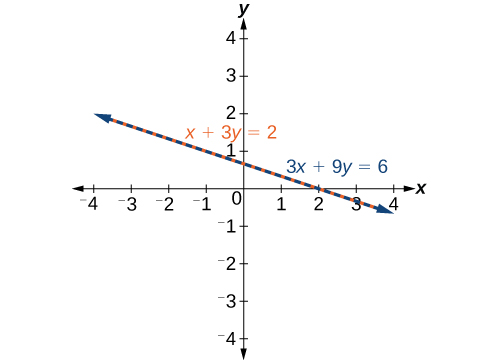
Try It
Solve the following system of equations in two variables.
The system is dependent, so there are infinite solutions of the form
Using Systems of Equations to Investigate Profits
Using what we have learned about systems of equations, we can return to the skateboard manufacturing problem at the beginning of the section. The skateboard manufacturer’s revenue function is the function used to calculate the amount of money that comes into the business. It can be represented by the equation where
quantity and
price. The revenue function is shown in orange in Figure 11.
The cost function is the function used to calculate the costs of doing business. It includes fixed costs, such as rent and salaries, and variable costs, such as utilities. The cost function is shown in blue in Figure 11. The-axis represents quantity in hundreds of units. The y-axis represents either cost or revenue in hundreds of dollars.
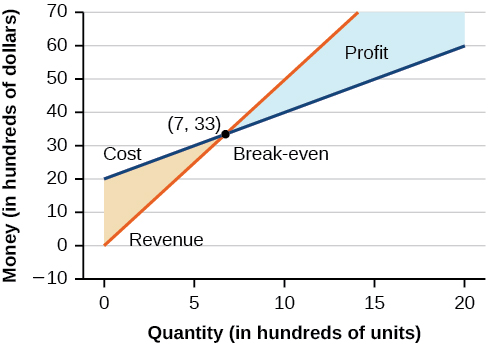
The point at which the two lines intersect is called the break-even point. We can see from the graph that if 700 units are produced, the cost is $3,300, and the revenue is also $3,300. In other words, the company breaks even if they produce and sell 700 units. They neither make money nor lose money.
The shaded region to the right of the break-even point represents quantities for which the company makes a profit. The shaded region to the left represents quantities for which the company suffers a loss. The profit function is the revenue function minus the cost function, written as Clearly, knowing the quantity for which the cost equals the revenue is of great importance to businesses.
Finding the Break-Even Point and the Profit Function Using Substitution
Given the cost function and the revenue function
find the break-even point and the profit function.
Write the system of equations using to replace function notation.
Substitute the expression from the first equation into the second equation and solve for
Then, we substitute into either the cost function or the revenue function.
The break-even point is
The profit function is found using the formula
The profit function is
Analysis
The cost to produce 50,000 units is $77,500, and the revenue from the sales of 50,000 units is also $77,500. To make a profit, the business must produce and sell more than 50,000 units. See Figure 12.
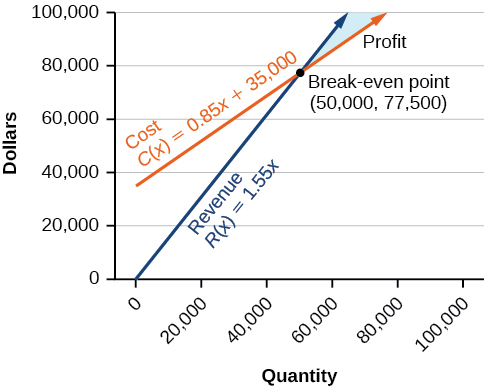
We see from the graph in Figure 13 that the profit function has a negative value until when the graph crosses the x-axis. Then, the graph emerges into positive y-values and continues on this path as the profit function is a straight line. This illustrates that the break-even point for businesses occurs when the profit function is 0. The area to the left of the break-even point represents operating at a loss.
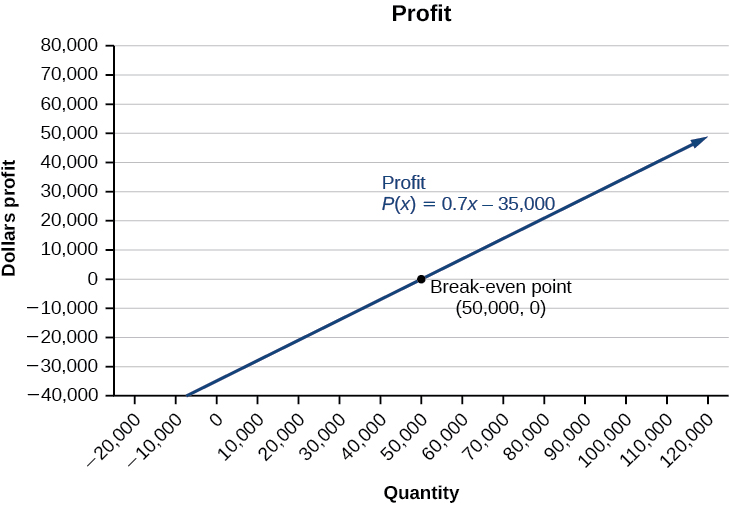
Writing and Solving a System of Equations in Two Variables
The cost of a ticket to the circus is for children and
for adults. On a certain day, attendance at the circus is
and the total gate revenue is
How many children and how many adults bought tickets?
Let c = the number of children and a = the number of adults in attendance.
The total number of people is We can use this to write an equation for the number of people at the circus that day.
The revenue from all children can be found by multiplying by the number of children,
The revenue from all adults can be found by multiplying
by the number of adults,
The total revenue is
We can use this to write an equation for the revenue.
We now have a system of linear equations in two variables.
In the first equation, the coefficient of both variables is 1. We can quickly solve the first equation for either or
We will solve for
Substitute the expression in the second equation for
and solve for
Substitute into the first equation to solve for
We find that children and
adults bought tickets to the circus that day.
Try It
Meal tickets at the circus cost for children and
for adults. If
meal tickets were bought for a total of
how many children and how many adults bought meal tickets?
Access these online resources for additional instruction and practice with systems of linear equations.
Key Concepts
- A system of linear equations consists of two or more equations made up of two or more variables, such that all equations in the system are considered simultaneously.
- The solution to a system of linear equations in two variables is any ordered pair that satisfies each equation independently. (See Figure 2)
- Systems of equations are classified as independent with one solution, dependent with an infinite number of solutions, or inconsistent with no solution.
- One method of solving a system of linear equations in two variables is by graphing. In this method, we graph the equations on the same set of axes. See (Figure 4).
- Another method of solving a system of linear equations is by substitution. In this method, we solve for one variable in one equation and substitute the result into the second equation.
- A third method of solving a system of linear equations is by addition, in which we can eliminate a variable by adding opposite coefficients of corresponding variables. (See Figure 6).
- It is often necessary to multiply one or both equations by a constant to facilitate elimination of a variable when adding the two equations together. (See Figure 8.)
- Either method of solving a system of equations results in a false statement for inconsistent systems because they are made up of parallel lines that never intersect. (See Figure 9.)
- The solution to a system of dependent equations will always be true because both equations describe the same line. (See Figure 10.)
- Systems of equations can be used to solve real-world problems that involve more than one variable, such as those relating to revenue, cost, and profit. (See Figures 11, 12, and 13.)
- addition method
- an algebraic technique used to solve systems of linear equations in which the equations are added in a way that eliminates one variable, allowing the resulting equation to be solved for the remaining variable; substitution is then used to solve for the first variable
- break-even point
- the point at which a cost function intersects a revenue function; where profit is zero
- consistent system
- a system for which there is a single solution to all equations in the system and it is an independent system, or if there are an infinite number of solutions and it is a dependent system
- cost function
- the function used to calculate the costs of doing business; it usually has two parts, fixed costs and variable costs
- dependent system
- a system of linear equations in which the two equations represent the same line; there are an infinite number of solutions to a dependent system
- inconsistent system
- a system of linear equations with no common solution because they represent parallel lines, which have no point or line in common
- independent system
- a system of linear equations with exactly one solution pair
- profit function
- the profit function is written as
revenue minus cost
- revenue function
- the function that is used to calculate revenue, simply written as
where
quantity and
price
- substitution method
- an algebraic technique used to solve systems of linear equations in which one of the two equations is solved for one variable and then substituted into the second equation to solve for the second variable
- system of linear equations
- a set of two or more equations in two or more variables that must be considered simultaneously.

